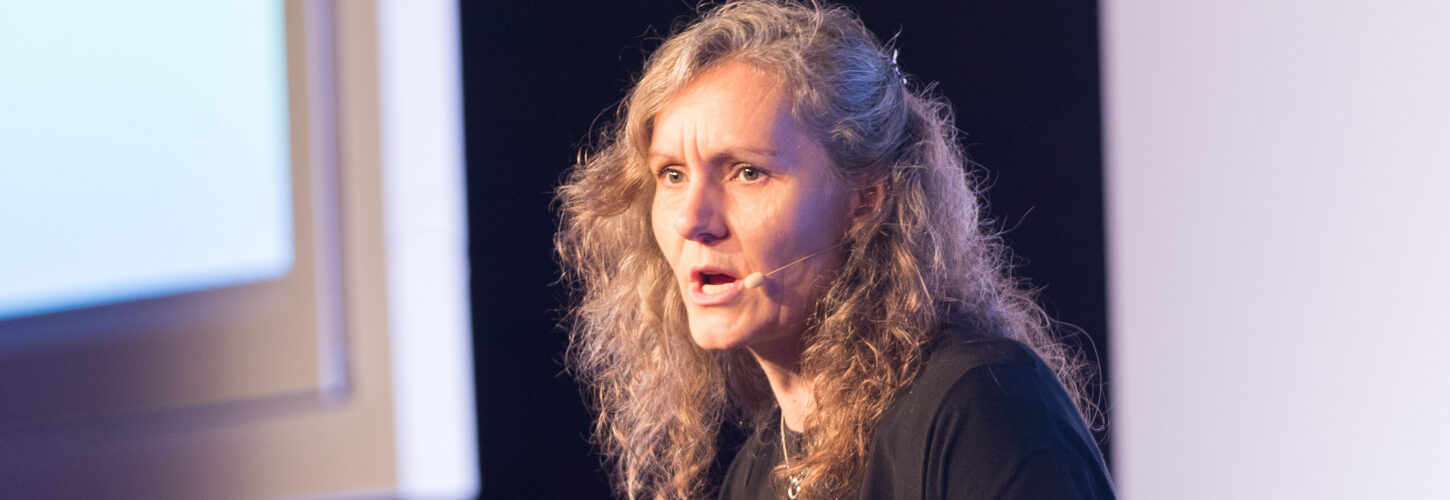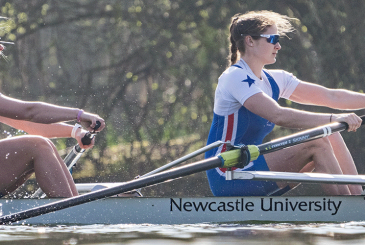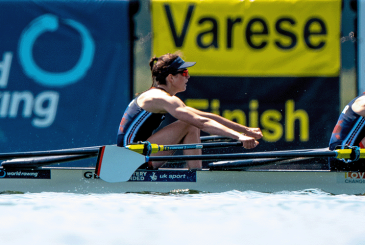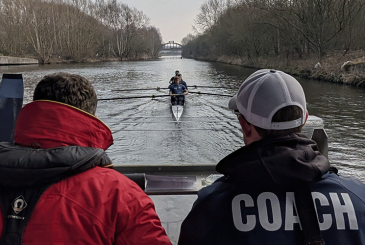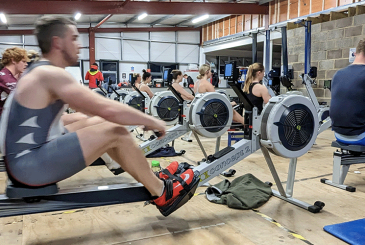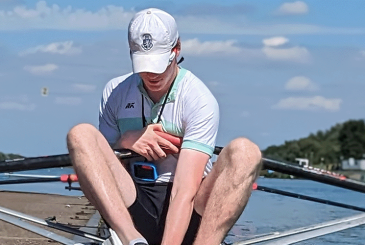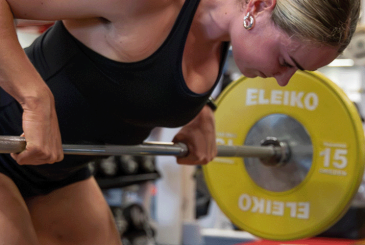Olympic silver medallist Cath Bishop challenges our cultural obsession with winning in her book, The Long Win. She proposes a new way to define success and reach our potential
Cath Bishop competed in three Olympic Games and won an Olympic silver medal with Katherine Grainger in the women’s pair at the 2004 Games in Athens. Away from rowing, she pursued a career as a diplomat, specialising in conflict issues and serving in Bosnia and Iraq. Also Chair of Love Rowing, British Rowing’s Charitable Foundation, Cath is passionate about supporting the next generation of rowers.
She says: “The book has been swirling about in my head for many years, but I first started putting pen to paper (or finger to keyboard) in 2017.
“It’s then been quite a journey to organise both my personal and professional experiences on this topic alongside research from different disciplines and relevant stories and interviews from others.
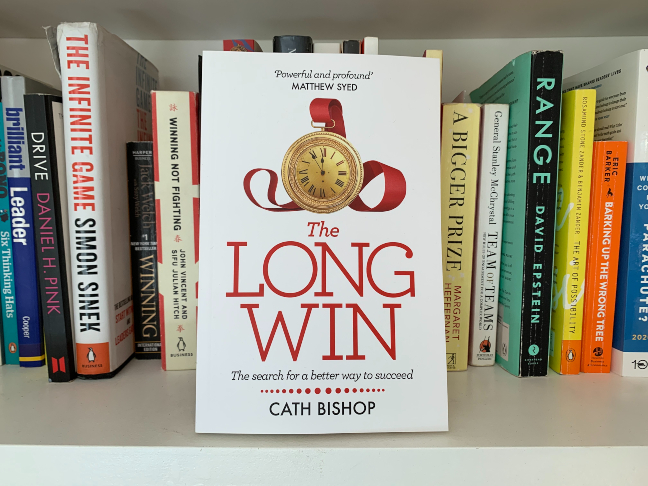
“Not sure if it was an easy topic, but it certainly felt a really important topic.”
Soon after The Long Win was published, Cath took time out of her busy schedule to answer our questions.
British Rowing: What do you mean by ‘the long win’ – and what specific personal experiences shaped this philosophy?
Cath: “The Long Win is my proposal for how we might redefine what success means on our own terms in order to help us to reach our potential better, together. It draws on my own experiences as an Olympic rower, a diplomat working in policy and negotiations in conflict-affected parts of the world, a parent and now a business coach and consultant developing leaders and teams in organisations.
“The roots of ‘Long-Win Thinking’ started towards the end of my rowing career and coincided with a shift in sports psychology. After finishing seventh and then ninth at my first two Olympics, I took a year off and reflected on what I had experienced.
“In those early days, there was little sports psychology and deeply entrenched macho coaching narratives which emphasised the ‘will to win’, valuing pain, sacrifice and physical toughness above all.
“I committed to this narrative as much as anyone, but I started to realise it wasn’t helping me to achieve my potential as an athlete. After a break and a fresh perspective (having started my career at the Foreign Office), I decided to come back to try for a third Olympics, but this time with a different mindset.
“A medal won at the cost of a lifelong mental health issue or other lasting negative costs loses its value”
“I knew that I could finish ninth or lower again – in fact, I knew that there would be really outstanding, dedicated and committed athletes who would finish ninth or lower. So, whilst, I of course wanted to come first as much as ever, I didn’t demonise or denigrate finishing lower in my mind and, accepted that the outcome was not fully in my control. What was in my control, however, was my approach.
“The 3Cs of clarity, constant learning and connection came out of that different approach.
“First, clarifying what mattered beyond results. I had started my diplomatic career by this point and knew it would continue after Athens, and this gave me a much broader perspective within which to see the amazing opportunity I had to compete at one more Olympic Games.
“I also made sure that success was about what I achieved each day that I could take with me into my future career, not just about race results.
“Second, constant learning relates to the subtle, but crucial shift in sports psychology that became widespread across Olympic sport in the UK 20 years ago.
“Sports psychologists separate the concepts of ‘performance’ and ‘results’ – we can continuously develop and invest all our energies in the former, but must accept that we cannot completely control the latter. Results depend on how fast others go and a range of external factors as well as our own performance (and in 2020, whether there is a global health pandemic or not.)
“This ‘performance mindset’ teaches us to improve every aspect of performance that we can improve daily – not just technique, fitness, strength and endurance, but also communication, collaboration, recovery and our mindset. If we become world-class at improving, we optimise our chances of getting the best result we can when that moment comes.
“Third, prioritising the human connections in everything that we do means that we put people first, that wellbeing and support underpin performance, and through that we can create a richer training and competition experience for everyone.”
“It’s important to clarify, that I am not against winning, competition or the desire to do our best”
A recurring theme seems to be how we should – and can – adjust our mindsets to reassess our values of success. How do you see this working in the rowing community – not just at a performance level but at a club level too?
“2020 has given us all valuable space to reconsider what success means. Have we all failed because we haven’t been able to compete and win medals this year?
“It’s a reminder to consider carefully what we deem to represent ‘success’, what we recognise and reward, and what we value and develop in our environments at any level.
“If we only value outcomes, then we are bereft if we don’t achieve those, or if the opportunity to win those is taken away.
“If we only value results, then we also create a particular (and in my view, narrow) experience for athletes and coaches, with ways of thinking and behaving that can often prevent us from reaching our potential over the longer-term.
“I love the work that The True Athlete Project are doing to rebalance our performance environments (grassroots to elite) by focusing on discussions around values and identity, mindfulness and the role of compassion in sport, as well as considering our social responsibility – we all know the crucial role that rowing clubs can play in their local communities, and the influence that our Olympic and Paralympic athletes have as role models – this is part of a greater picture of sporting success that goes beyond just medals.
“It’s important to clarify, that I am not against winning, competition or the desire to do our best. I do not want to lower standards at any level of our sport. Quite the opposite. I want to challenge the framework we put around winning, competition and success in order to consider how we might do it better.”
“What will it mean if we don’t win? What might we still gain as individuals and a club?”
What are your tips for encouraging ‘long win’ thinking and, as someone well used to operating in highly competitive and performing environments, how do you approach this on a daily basis yourself?
“I think it’s critical to think about why we row first and foremost, and what values underpin our daily approach, rather than just charging headlong into the winter training programme with ambitions to win later in the year.
“Take time to discuss as a crew, team or club, ‘Why is it important for us to win?’ ‘What will it mean when we do win?’ ‘How will that help us as individuals and a club?’ ‘What will it mean if we don’t win?’ ‘What might we still gain as individuals and a club?’ It’s about getting clear about the ‘why’, which informs the ‘how’ and then the ‘what’ in our training environments.
“Psychologists have proven that when motivated intrinsically, we can draw on far greater and longer-lasting resources within ourselves and activate positive motivations for performance rather than relying on fear-based motivations that are ultimately limited and limiting.”
The GB Rowing Team is measured on the medals that it brings home from the Olympic Games. UK Sport focuses on ‘medals and more’ – how can we focus on ‘more’ and put people first, while still bringing home the medals?
“I think there is a shift about to take place in this space, and it’s about time. Clearly, welfare must come first. A medal won at the cost of a lifelong mental health issue or other lasting negative costs loses its value and brings negative consequences for sport and society, damaging athlete retention and the attraction of future athletes, as well as undermining what sport represents to all those who want to connect with it and be inspired by it across society.
“UK Sport are about to shift their strategy. The challenge is to ensure deep culture change accompanies the shifts in structures and policies. It will take time, but it’s about setting ourselves up for the next 20 years of sustainable high performance, learning the lessons of what has worked well and less well from the last 20 years (in line with all good performance thinking!).”
“The list of athletes who finish first and feel empty, depressed or unfulfilled is long and spans many Olympics sports and many countries”
There is some fascinating research about which colour medallist seems to be happiest in the long term… What are your thoughts on this and how it has fed into your book?
“The research is interesting, that bronze medallists are at least as happy as the gold medallists, and silver medallists are the least happy on the podium – one study even suggested that silver medallists live less long…
“But the real lesson is that this is not about where you finish but about your expectations and comparisons – bronze medallists are comparing themselves to fourth-placed finishers and therefore feeling grateful and joyous; silver medallists are comparing themselves to the gold medallists one step higher and therefore feeling they have fallen short; gold medallists are often underwhelmed, feeling relief and anti-climax, sometimes even emptiness.
“These trends are not fixed to where you finish, but how you define success, and whether it is based on a comparison with others or defined on your own terms.
“I think we focus too much on the moment a crew crosses the line in first place, without looking at the richer story of the gold medallist that went before that moment, and without appreciating all the others in that race who contributed to making it a thrilling race. For me, it’s the intricacies of tactics, decision-making and the stories within races that are often much more exciting than simply the results at the end of the race – yet it’s become engrained to focus only on that split-second at the end.
“The list of athletes who finish first and feel empty, depressed or unfulfilled, is long and spans many Olympics sports and many countries. The common factor is that single moment of reaching the pinnacle has become disconnected from the rest of an athlete’s life, devoid of meaning beyond that moment, and sometimes pursued at a deep long-term cost.
“If winning isn’t even working for the winners – let alone those discarded who finish lower down – then surely it’s time to redefine what success looks like.”
In a previous interview, you talk about Roger Federer’s perspective after losing a Grand Slam final, despite an incredible performance…
“I think that Federer and Nadal demonstrate some of the best examples of performance that goes beyond winning.
“In some of those legendary five-set Grand Slam finals, it is the pursuit of new levels of excellence in tennis that is truly thrilling to witness; the result feels secondary to that.
“On one occasion after losing a closer five-set thriller, the interviewer asked Federer who had narrowly lost, whether he regretted being around at the same time as Nadal. His facial reaction showed that he couldn’t really comprehend this way of thinking, as he explained that he might have won more titles had that been the case, but they would have been much less meaningful as the level of tennis he would have reached would have been lower and he would not have been the tennis player and the man that he was now.
“That says it all!”
“The events and crises in 2020 have forced us to re-evaluate what matters – is it our annual sales figures in a business or our health?”
The COVID-19 pandemic has made us reassess our values in many ways. What we can do as a society to keep these in mind as we go forward?
“It’s about asking questions about what matters on an ongoing basis, not just one-off. The events and crises that many of us have faced in 2020 have forced us to re-evaluate what matters – is it our annual sales figures in a business or our health? Is it winning a medal or the connections we have at a deeper level with others in our sport? And many more.
“Let’s keep asking these questions, as they keep us considering the most important things in our lives and making decisions around those, rather than prioritising short-term, superficial goals and metrics.”
On a personal note, you’ve had an extraordinary career both on and off the water. What memories do you treasure the most?
“Definitely the connections with incredible people along the way and the lifelong friendships formed, and those hidden moments when things click and the boat flies on a beautiful lake surrounded by mountains, or shared moments of resilience and humour in the midst of incredibly tough training.
“Special moments when things seemed impossible – perhaps I was having a rough patch of performance, and yet a few people around me believed in me, went out of their way to support me and helped me through it.
“I have learnt to value the small things that really matter, not the medals but the friendships”
“Or simply moments when I had a conversation with someone who stretched my thinking, challenged my perspective and helped me to develop in some way.
“I have loved the fact that the book has connected and reconnected me with many former friends and colleagues in sport and again stretched my thinking in lots of new ways.”
And what lessons have you learned along the way that have made you into the person that you are today?
“I think I have learnt to value the small things that really matter, not the medals but the friendships, the support when things were tough, the wonderful moments of just being alongside crewmates on one of our beautiful bendy, twisty rivers, whatever the weather.
“I really value the rowing community that is full of unbelievable people who love our sport, who don’t do it for fame and glory, who volunteer hours of their lives in order to enable young people or elite rowers to train and compete, and their dedication and love of the sport is something I hugely cherish.”
Cath’s book, The Long Win, is priced at £11.99 and available from Amazon. Find out more about Cath here.
Photo: Paul Clarke


